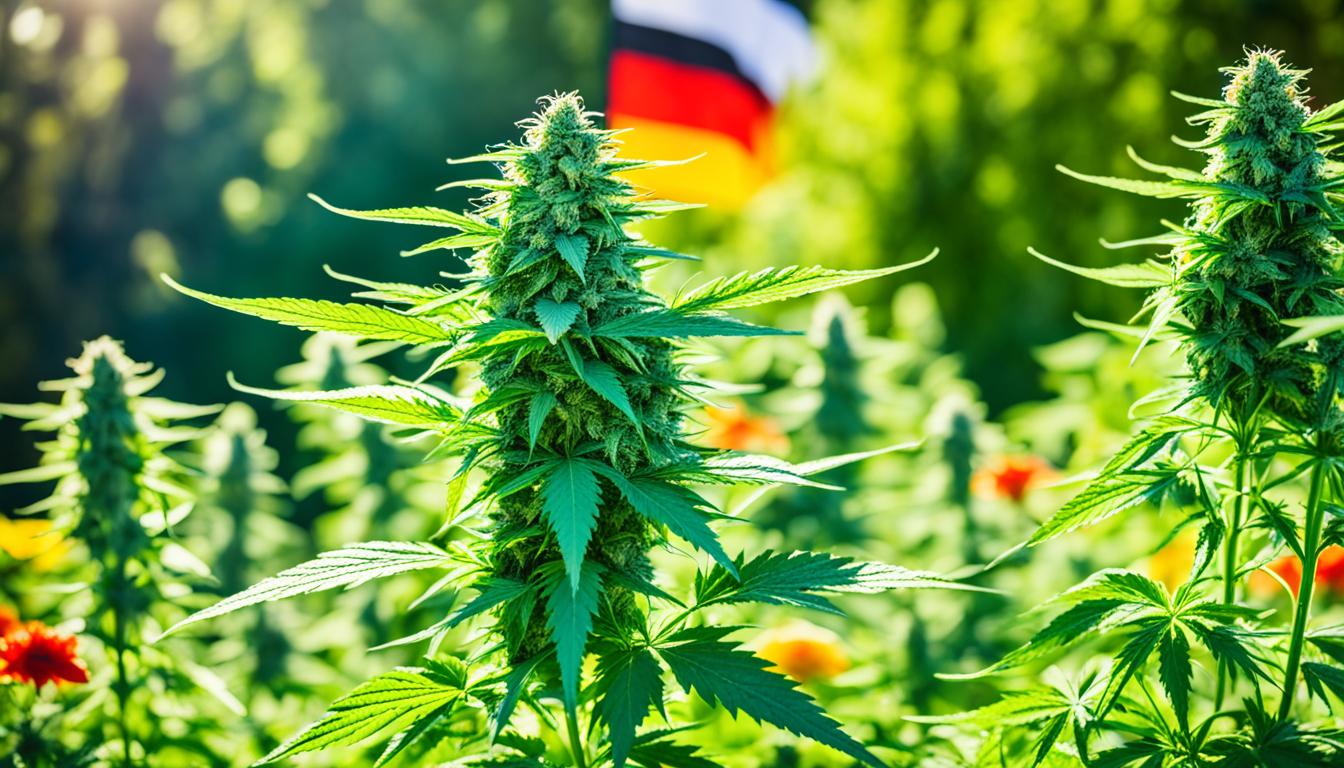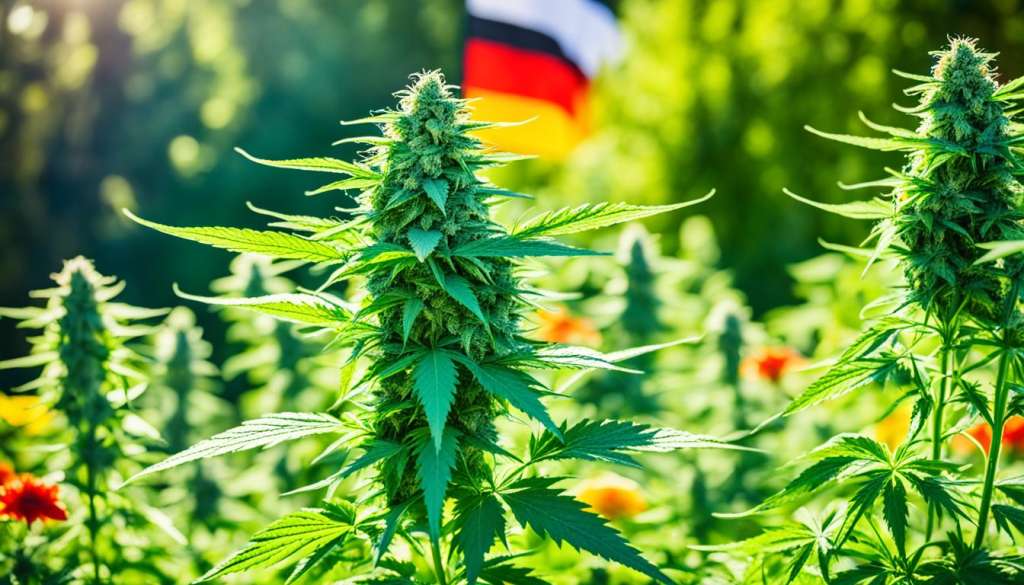
Germany Becomes the Largest EU Nation to Decriminalise Cannabis
Share This Article
Germany has made a big change by decriminalising recreational cannabis use. This marks a significant change in Europe’s drug policy. It shows a growing acceptance of cannabis and marks a new direction in EU cannabis laws.
By allowing people to have and grow cannabis within limits, Germany is taking a modern approach. However, there are discussions about how this might affect young people and law enforcement. Germany aims to find a balance between freedom and control over cannabis marketing and use.
This big change might encourage other EU countries to rethink their cannabis policies. With this move, Germany joins other European countries that allow medicinal cannabis. It’s a major step forward in how the EU manages recreational cannabis.
Key Takeaways
- Germany’s new law allows adults to possess and cultivate recreational cannabis, signalling a shift in EU cannabis legislation.
- An inspired approach to regulation introduces “cannabis clubs” as a controlled method of cultivation and distribution.
- Heightened safeguards alongside decriminalisation aim to discourage underage use and public consumption near schools.
- Meticulous monitoring will assess the reform’s impact on public safety and youth protection.
- Germany’s action could catalyse similar reforms amongst European neighbours with evolving drug policies.
The Historical Shift in Germany’s Cannabis Legislation
In a significant move, Germany has redefined European Drug Policy by legalising marijuana. This puts Germany at the forefront of liberal cannabis laws in Europe. Now, Germany is the third EU country to legalise cannabis for personal use, after Malta and Luxembourg. It’s also the largest EU nation to decriminalise recreational cannabis.
In Germany, people can have up to 50 grams of cannabis at home and 25 grams in public places. Adults can grow up to three plants for their use. This marks a huge change from the past strict rules. This new law will start on 1st April 2024. It’s a result of the work by the coalition government who promised to legalise cannabis.
However, the journey to this law wasn’t easy. Some states, like Saxony and Bavaria, opposed it. They were worried about how past cannabis crimes would be handled. Even so, the Health Minister wants the bill passed quickly. But, police are concerned about how to enforce the new rules, especially the ban on smoking cannabis near schools.
The effects of this change in Germany will be big. Cannabis won’t be sold on the black market anymore. Instead, licensed clubs will sell it. This shows how Europe is changing its view on drug policies. It might even lead to more changes in the future.
Even with these new laws, Germany is being careful. They are keeping cannabis illegal for those under 18. This shows they are trying to balance freedom with public health and safety. As Germany starts this new era, all of Europe is watching. They’re interested in seeing how this law will affect Germany and possibly, drug policies in other countries.
Understanding the New Cannabis Law in Germany
Germany is making big changes to its cannabis policy. It’s poised to be the third EU country to legalize it for adults. The Cannabisgesetz marks the start of a new era. It includes age limits, rules for growing at home, and deals with EU concerns. This could lead other European countries to do the same.
Age Restrictions and Personal Cultivation Limits
The new law sets the Germany Cannabis Age Limit at 18 years and up. This matches adult freedom with responsibility. Adults can grow up to three plants each. This supports both personal use and cultivation rights. You can have up to 25 grams in public and 50 grams at home, keeping a balance between freedom and control.
Germany’s allowance for personal cultivation contrasts with the broader EU stance. It shows Germany as progressive in domestic cannabis policy. These growing rights view cannabis use as a personal choice. Yet, they align with regulations to keep things orderly and prevent misuse.
The Opposition from EU and Alternative Distribution Plans
Germany faces challenges balancing national goals with EU rules. The idea of Cannabis Social Clubs has come up as a new way to distribute cannabis, avoiding traditional retail routes. These clubs would be community-based, limited to 500 adult members. They won’t just supply cannabis, but also offer job opportunities, with income possibilities of up to €538 monthly for members.
The government is thinking about a trial program for selling cannabis, to find a middle ground acceptable to the European Council. Germany’s moves might inspire similar legislation across Europe, proving its role as a leader in cannabis policy.
| Policy Aspect | Specifics | Impact |
|---|---|---|
| Age Limit | 18 years and older | Aligns use with adult status |
| Possession Limits | 25 grams (public), 50 grams (private) | Moderates public consumption and private storage |
| Home Cultivation | Limit of 3 plants/adult | Promotes personal cultivation and sustainability |
| Membership-Based Distribution | Cannabis Social Clubs (500 members max) | Introduces controlled distribution and minor employment |
| EU Adaptation Strategy | Retail sales pilot program discussion | Elicits negotiation with EU regulations |
The Cannabisgesetz opens new doors for Germany in legal cannabis trading. It puts young people’s safety first in the law. Germany is creating a custom solution to the ongoing conversation about freedom, health, and social standards.
Implications for Public Health and Safety in Germany
Germany’s new cannabis law has sparked a lot of talk. This discussion focuses on Public Health Cannabis Germany and Safety Concerns. Medical Associations have expressed worries about the effects on young Germans’ health and development. They look for new public health strategies to teach people about the dangers of misusing cannabis.
Addressing the Concerns of Medical Associations
Medical associations in Germany are watching the new law closely. They are concerned about its effect on public health, especially for young people. They want strict tests set up within 18 months. Their goal is to understand how this law affects young people and keeps them from abusing drugs.
Police and Law Enforcement’s Response to Legalisation
Law Enforcement teams are getting ready for big changes. They aim to enforce new rules that are for adults only, and fight the drug trade. Police will work hard to make sure only adults over 18 can have and grow cannabis. They also want to keep drugs away from places where young people spend time.
| Aspect | Details |
|---|---|
| Possession and Cultivation | Up to 25 grams of marijuana for adults 18 and over, with personal cultivation limited to three plants. |
| Cannabis Clubs | Establishment of clubs with a 500 member cap, facilitating cultivation and monthly personal use limits. |
| Youth Restrictions | Stricter monthly limits for those under 21, with prohibited usage and cultivation in proximity to youth-centric venues. |
| Enforcement | Dealers face stringent penalties for selling to minors, fortifying the legislative intent to protect youth. |
With Germany entering a new phase of cannabis legality, Public Health advocates, Medical Associations, and Law Enforcement are all paying close attention. They all share concerns about safety in our changing society.
Germany’s Approach to Cannabis Tourism and International Perspectives
Germany is changing its cannabis laws after decriminalisation. The country focuses on stopping Weed Tourism Germany through strict rules. This avoids making Germany a hub for drug tourism. Instead, it tries to carefully balance freedom and public duty. This careful planning helps Germany avoid problems that other countries have faced with International Cannabis Policies.
Germany chooses not to follow the Netherlands in being lenient with cannabis. This careful method is different from some EU countries where easy access to cannabis has attracted tourists but also brought criticism. Information from countries like the UK helps Germany think about its own policies. These stats show how cannabis is used and controlled.
| Country | % of 15–64-year-olds Having Used Cannabis at Least Once | Noteworthy Policies/Outcomes |
|---|---|---|
| United Kingdom | 29.4% (European drug report 2017) | Largest legal cannabis exporter as of 2016; licenses for hemp processing; Rural Development Programme funding |
| Portugal | 9.4% | Decriminalisation of all drugs for personal use; focus on harm reduction and treatment |
The UK’s big cannabis export business matches its hemp growing licenses since 1993. Portugal is known for making all drugs for personal use not a crime. Germany looks at these models and their effects carefully.
Germany wants to follow International Cannabis Policies while dealing with Drug Tourism EU worries. It aims for a middle ground between limiting tourism and allowing personal use. This could shape new laws in the Union.
Comparison to Other European Nations’ Cannabis Policies
Germany’s new rules on cannabis have sparked interesting talks. We compare this to laws in other European countries. Malta is known for its relaxed Cannabis Policy, allowing individuals to carry and grow cannabis at home. Luxembourg also supports the use of cannabis for fun, leading the way in their area.
This shows a step towards changing old drug laws in the European Union. The Dutch are famous for their Dutch Coffee Shops. Here, selling cannabis is allowed under strict rules, even though it’s illegal. Spain has an interesting take with Cannabis Clubs, especially in Barcelona. These clubs are quite popular there. Germany’s laws add to the bigger picture of cannabis rules in Europe. They show a shared goal to manage and reduce negative views on cannabis use.
Malta and Luxembourg’s Liberal Stances on Cannabis
Malta and Luxembourg are showing Europe’s shift towards softer cannabis laws. Their actions consider real usage and aim to ease pressures on the legal system. German lawmakers have looked to these European Cannabis Laws for inspiration. They have shaped their laws with a focus on protecting young people and public health.
The Netherlands and Spain’s Decriminalisation Measures
The way Europe is decriminalising cannabis varies by country, but their approaches complement each other. The Netherlands has a practical way, and Spain shares its unique cannabis clubs with the world. These examples have influenced Germany’s current cannabis policy. All these changes, fuelled by cultural and political reasons, show that reform in Europe is diverse but united.
FAQ
What does the decriminalisation of recreational cannabis in Germany entail?
What prompted Germany to reform its cannabis legislation?
Are there any age restrictions or limits on cannabis cultivation for personal use?
How will cannabis be distributed in Germany given the EU’s objections?
What are the public health concerns stemming from legal cannabis in Germany?
What challenges do police face with the legalisation of cannabis in Germany?
How is Germany planning to prevent cannabis tourism?
How does Germany’s approach to cannabis compare to other European countries?
Could Germany’s new cannabis laws impact other European nations’ drug policies?
Will it be legal for tourists to purchase and consume cannabis in Germany?
Further Reading
- https://www.forbes.com/sites/sarahsinclair/2024/01/31/where-is-cannabis-legal-in-europe-a-guide-to-the-latest-policy-changes/
- https://www.pbs.org/newshour/world/germanys-parliament-votes-to-legalize-limited-marijuana-possession-and-allow-cannabis-clubs
- https://www.nytimes.com/2023/08/16/world/europe/germany-legal-marijuana.html
- https://www.theguardian.com/world/2024/feb/23/germany-on-track-to-partly-legalise-cannabis-for-personal-use-after-heated-debate


